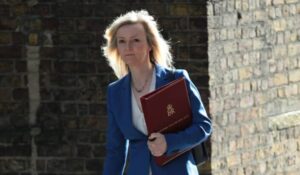
Former prime minister Liz Truss has made a speech on the economy this morning urging the government to cut taxes in a speech one year after her disastrous mini-budget.
Appearing at the Institute for Government think tank to call on Rishi Sunak to shrink welfare spending and raise the retirement age, as well as to defend decisions made during her brief spell in Number 10.
Ms Truss said that it was “unfair” to say she had pursued unfunded tax cuts.
The MP for South West Norfolk spent 49 days in Number 10 last year before she was forced out of office in October 2022 following a budget of £45 billion of tax cuts outlined by her chancellor Kwasi Kwarteng triggered an economic crisis.
After Mr Kwarteng set out a package that included abolishing the top rate of income tax for the highest earners and axing the cap on bankers’ bonuses while adding restrictions to the welfare system, the pound fell to a fresh 37-year low against the US dollar as “spooked” traders swallowed the cost of the spree.
Defining the decisions Truss said: ” I felt we needed to begin reforming our tax system with measures to make it more business-friendly and make the UK a more attractive place to invest.
The impending hike in corporation tax needed to be reversed. Cutting the top rate of income tax would show Britain was open to talent.
Reforming IR35 would have cut red tape for small businesses. And a return to VAT-free shopping for foreign visitors would make our great cities more attractive.
Some people have described these as “unfunded tax cuts”. This is not a fair or accurate description.
Independent calculations by the CEBR [the Centre for Economics and Business Research] suggest that cutting the higher rate of income tax and the ‘tourist tax’ would have increased rather than decreased revenues within five years.
So quite the opposite of being unfunded, these tax cuts could have increased funding for our public services.
The CEBR also says that the cost of freezing corporation tax was much less than the Treasury suggested.
Their costing of the measures was £25bn over five years, not £45bn.
Regrettably the static models used by the OBR failed to acknowledge this.”
Commenting about her speech, Qdos CEO, Seb Maley, said: “A lot of what Liz Truss has said will resonate with businesses, particularly the smallest enterprises. The tax burden is at a 70-year high and, combined with inflation, things have become very difficult for the millions of people working for themselves in the UK. Perhaps big change is required.
“The IR35 legislation is a huge thorn in the side of freelancers, contractors and, more recently, businesses engaging these workers. It’s no secret that the government needs to address the fundamental flaws of the off-payroll working rules. As Truss said, sorting out IR35 must be prioritised.
“The recent hike in corporation tax is only going to hit the smallest businesses the hardest, too. Such a leap in this tax will hold back businesses and the self-employed at a time when the economy needs them more than ever.”
Read more:
Liz Truss urges government to cut taxes one year on from disastrous mini-budget





